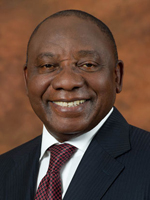Let the dialogue begin. Let all voices be heard.
 Dear Fellow South African,
Dear Fellow South African,
The first National Convention of the much-anticipated National Dialogue concluded on Saturday afternoon with a resounding call for the conversation among South Africans to begin.
The convention, which was attended by just over 1,000 delegates from organisations drawn from all sectors of society, was the kick-off for thousands of public dialogues that will take place for the next few months and into the beginning of next year.
The public dialogues will take place at a local level in wards and at a sectoral level. Citizens will also be encouraged to organise their own dialogues, bringing people together to discuss the issues that concern them and to look for solutions to the challenges they face.
The outcomes of each of these dialogues will be recorded and collated through a special digital platform. There will also be mechanisms in place to enable those without access to the technology to submit the outcomes of their dialogues.
All of these discussions will culminate in a second National Convention to be held during the first half of 2026. It is anticipated that this convention will produce a clear vision for the country and adopt a social compact that outlines the roles and responsibilities of all sections of society, from citizens to the arms of the state, from business, labour, traditional leaders, religious bodies to civil society, activist and civic organisations. The form and content of these outcomes will ultimately be determined by the South African people through their discussions.
The first National Convention reflected the great diversity of our country’s people and their enthusiasm to get involved in the debate. Delegates were clear that citizens themselves must determine the issues discussed and must use whatever approaches and methods that suit them and their circumstances. They noted that what might work in a densely-populated city may not work in a rural area where villages are far apart. What might work in a sector that is well organised may not work among people who may not be part of organised formations.
There was a strong emphasis at the convention on inclusion and participation, with some delegates expressing concern that important voices were missing from the gathering. There was a firm view that special efforts should be made to reach and include groups and people who were often left out or marginalised.
Preparations for the National Dialogue have been underway for many months, drawing together foundations of struggle stalwarts, civil society bodies and the Presidency. They were given the responsibility to organise the first National Convention and lay the basis for the public dialogues that would follow it.
The convention was the moment at which the people of South Africa would take over the National Dialogue. Delegates discussed the formation of a Steering Committee, consisting of nominees from all sectors of society, to take the process forward. Each of the sectors held discussions at the convention on how they would select their respective nominee for the Steering Committee by the end of August 2025. They agreed that these processes need to be inclusive and that the Steering Committee needs to be representative.
In taking the National Dialogue forward, the Steering Committee would be supported and guided by the Eminent Persons Group, prominent South Africans tasked with championing the dialogue and providing advice. The Eminent Persons Group will also advise the Head of State as the convenor of the National Dialogue to ensure that it is inclusive and credible.
There should be no person, no part of society and no institution – either public or private – that is excluded from the conversation. The dialogue should break down the barriers between ‘insiders’ and ‘outsiders’ and challenge notions of ‘us’ and ‘them’. At the same time, we should not seek a form of unity that is based only on sentiment, but a unity that is forged through constructive and honest discussion on the difficult questions our country faces – and an agreed programme of action.
We should not be afraid to disagree. Disagreeing is part of engaging in a meaningful and robust dialogue. It is through the expression of different views that we will be able to give full legitimacy and credence to the dialogue. We should therefore make a determined effort to air our differences with a view to finding agreement on the actions we need to take together to build a better society, in which every person has an equal opportunity to prosper.
We are about to embark on one of the most important undertakings in the history of our democracy. We all have a responsibility to make it work. Let the dialogue begin and let every voice be heard.
With best regards,
Cyril Ramaphosa is the President of South Africa
Legal Disclaimer:
EIN Presswire provides this news content "as is" without warranty of any kind. We do not accept any responsibility or liability for the accuracy, content, images, videos, licenses, completeness, legality, or reliability of the information contained in this article. If you have any complaints or copyright issues related to this article, kindly contact the author above.
